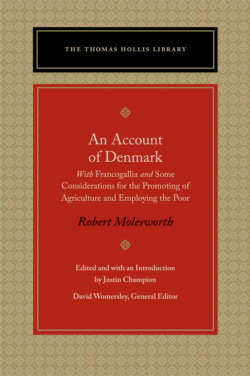Читать книгу An Account of Denmark - Robert Molesworth - Страница 14
На сайте Литреса книга снята с продажи.
ОглавлениеTEXTUAL POLICY
The intention has been to produce an edition of Molesworth’s major political writings that is accurate yet easily accessible to modern readers. The text has been modernized only in minor respects. Capitalization has generally been retained according to the original printed editions. Significant adjustment has been made to typographical layout: section titles, running heads, catchwords, and original pagination have been retained only where judged significant for authorial meaning or contemporary readings.
For the Account, which went into six editions—three published during Molesworth’s life—I have taken the third corrected edition as the copy text. The 1738 edition (owned by Thomas Hollis) was also collated, and some corrections of punctuation and spelling have been silently adopted from this edition (most commonly the replacement of a semicolon with a full stop).
Italics
In the original printed editions of the Account and Francogallia, italics were used for proper names, foreign language phrases, and terms under discussion, such as “Cologne” or “publick.” Quotations and paraphrases from other works were sometimes given in italics: the present edition abandons this practice in favor of using quotation marks where possible for citations. Italics for proper names and place names have been preserved where significant.
Spelling and Footnotes
This edition has preserved the irregular orthography of Molesworth’s day, including that of proper names and place names, except where there are clear mistakes (and these have been silently corrected). Spellings in old style have been retained: for example, chuse, compleat, shew, publick (and other –ck endings); similarly, words with contracted –ed endings have been retained, but those like rendred have silently become “rendered.”
Other silent adjustments to spelling and grammar have been made for clarity’s sake: for example, square brackets denote the inclusion of footnotes and words not in the original. Latin phrases have been reproduced as in the original (also italicized).
In this edition of Francogallia all instances of “Capevingian” have been replaced with the more modern “Capetian,” and “Carlovingian” with “Carolingian.”
Unless stated otherwise, all translations are by the editor.
